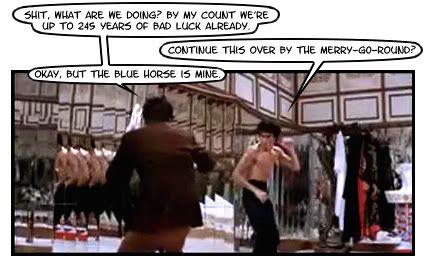6 Superstitions We All Believe and Why They Actually Make (Some) Sense
Superstitions are only for the gullible, and old men to bark at you from their front porch while waving canes, right? Perhaps, and yet you’re probably not going to walk under a ladder if you can help it, there’s always that twinge of regret when you break a mirror, and you spent most of last weekend making sure that voodoo doll of your ex looked just right. Where do these almost universal superstitions come from, and could their origins be more logical than we think?
Breaking a Mirror
Break a mirror, get 7-years bad luck. It may seem silly, but you probably still take extra care never to drop one, and generally do your best to avoid hall-of-mirrors shootouts and kung-fu battles.

Where the Hell Did This Come From?
After a hard day clubbing various things to drag back to his cave and hump, a caveman wanders to the lake for a drink and sees his own handsome sloping brow reflected back at him from the water. Having no knowledge of optics (at this point mankind’s still struggling with pointed-stick technology) it was a logical leap for him to believe that this reflection was a duplication of himself and shared a part of his soul. This way of thinking stubbornly held for millennia, with the belief being that damaging a mirror would damage a part of your soul or cause it to be trapped in the mirror forever.
There’s also a more simple explanation. Glass mirrors (as opposed to less breakable ones made of polished metal) weren’t really available until the 16th century and were very expensive luxuries reserved for the upper classes. If the servants that cleaned these mirrors were to break one, well, let’s just say it was a lot easier to replace a human being back then than a mirror. Also, if a more middle class family were to buy one and then break it, it would probably take quite a while to scrounge up the money for a new one (say around 7 years). Well, unless they sold off a few kids.

Spilling Salt
Spill salt and you’d better toss a pinch over your left shoulder or you’ll be in for bad luck. Oddly though, if you do the same thing after spilling the ketchup people tend to get all offended.

Where the Hell Did This Come From?
Salt’s ability to cure infections, purify water and make your wife’s shitty cooking tolerable if you dumped enough on led to it being worshipped by much of the ancient world. But wait a minute, tears were salty and plants wouldn’t grow anywhere salt had been dropped. The message from God was clear, salt was pretty awesome stuff, but if you let any fall, watch your ass.
Aside from that, salt simply used to be very valuable (the term “salary” comes from the fact that Roman soldiers were paid in salt). Mindlessly spilling the salt at a host’s table back in the day would be the equivalent today of taking their fine china out back for skeet shooting practice, or accidentally sitting on their purebred Lhasa Apso’s head.

This thing is a Lhasa Apso. Explaining jokes makes them funnier.
But why toss it over your shoulder? Well people used to believe that evil spirits, or the devil himself, hung over your shoulder waiting for you to slip up. The goal of throwing salt over your shoulder was to nail that asshole in the eyes, a technique repeatedly proven effective by numerous 80s pro-wrestlers.
The Rabbit’s Foot
While not particularly lucky for countless bunnies left dragging bloody stumps around, millions of people each year buy rabbit’s feet hoping they’ll bring them good luck and prosperity.
Where the Hell Did This Come From?
The simplest explanation is that rabbits’ ability to pump out offspring faster than a Catholic Angelina Jolie resulted in them being connected with potency and good luck (in other words, you may want to watch out if you find a few in a girl’s purse guys).
Rabbits are also nocturnal, and thus have long been associated with the moon. Easter, the actual most important Christian holiday on the calendar for those who worship more than buying shit, is also determined by the phases of the moon. Combine the moon tie-in with rabbits’ legendary humping abilities (which signifies rebirth) and you see how Jesus somehow got associated with these fluffy rodent-ey creatures, and surely anything Jesus/Easter related has to be lucky (just ignore the whole crucifixion thing that precipitated the holiday).

But why is the back foot specifically lucky? Well hares (which are often confused with rabbits) are one of the very few 4-legged animals whose back feet hit the ground before their front feet while running. The bar for impressing people back in the day was apparently set pretty damn low, and the strange tracks hares left were enough to convince people the back foot must have magical qualities.
Four-Leaf Clover
This Irish symbol is possibly the most well known good luck charm in the world, which is somewhat odd considering the whole “luck of the Irish” thing is a bit of an oxymoron.
Where the Hell Did This Come From?
The simplest reason the four-leaf clover is considered lucky is because they’re so rare, with only around 1 in 10,000 clovers sporting four leaflets. At least they were rare, as these days there are numerous places to buy your very own four-leaf clover online (although if you’re the type of person who thinks paying 25 dollars for an clover on the Internet is a good idea, the problems in your life likely have little to do with luck).
The use of clover as a lucky charm dates back to pre-Christian times when Druidism was the religion of day in Ireland. Druids, basically the hippies of the day, were sun/nature worshippers and clover tends to spread in sunny areas, possibly explaining why druids felt a connection with the plant. The four leaves also have a fairly obvious cross-like appearance, which was a revered symbol even before Christianity.
Clover is also edible and in fact, quite nutritious (some people think it even helps fight cancer). The Irish probably considered finding a patch fortunate, if only because it was a change from all the goddamn potatoes. Oh, and the four-leaf clovers are totally the best marshmallow shape in Lucky Charms.

For those who don't have the time to wait to develop diabetes.
Groundhog Day
Every year on February 2nd people put their faith in the amazing weather predicting abilities of the noble groundhog, hoping he won’t see his shadow and doom them to 6 more weeks of snow, ice and numb testicles. Hey, why not? Its predictions are probably as likely to be accurate as any weatherman’s.

Now as you see here, my weathercock is balls deep in Indiana. Balls Deep.
Where the Hell Did This Come From?
Folks have always kept their eye out for the reemergence of hibernating animals, logically seeing it as a sign that spring was on the way. February 2nd is also the date for Candlemas, a holiday mostly celebrated in Europe (yes, there’s another Christian holiday out there that starts with “C” and ends in “mas”, please don’t tell Hallmark).
Like most Christian holidays Candlemas is basically an old Pagan tradition with fancy new Jesus decals slapped on. While the holiday is officially devoted to the purification of the Virgin Mary, in practice it was mostly used as the due date to throw out your Christmas tree and watch furry critters emerge from their holes. Germans had Candlemas traditions similar to Groundhog Day (except they used hedgehogs) and when they immigrated to America they tossed out all the religious parts of Candlemas, keeping only the fun “waiting around a varmint-hole drinking” stuff. The groundhog was chosen since it hibernated in the winter, sorta looked like a hedgehog (which aren’t native to North America) and because too many people got eaten when they tried waiting outside a bear’s cave.
But why does the groundhog seeing it’s shadow and returning to its burrow mean 6 more weeks of winter? Well there’s actually some meteorological truth to it. A winter day sunny enough to allow a rodent to see his shadow is likely to be colder than average since cloud cover actually insulates the earth. In other words, there’s nothing mystical going on here, Mr. Groundhog just went back inside because he was freezing his furry little ass off, and if it’s still too cold for him there’s probably more winter coming.
Black Cats
You’re walking down the street and freeze for a second as a strange black cat saunters by. Now in reality the cat was simply crossing your path because he saw a nice patch of unspoiled dirt he wanted to poop in, but superstition tells us we’re about to be visited by bad luck and death.
Where the Hell Did This Come From?
So how did something oh-so-cutesy and fluffy get associated with death, devilry and witchcraft?

Saints preserve us! It's a basket of Satan!
Well, a number of pre-Christian peoples such as the Norse, Celts and Egyptians had cat Gods, or at least considered the animal sacred. Once Christianity became the sexy new religion in town though, old beliefs were branded witchcraft and cats found themselves guilty by association. Often simply owning a cat was considered proof of witchery and there was widespread extermination of cats during medieval times, which kind of backfired when they were no longer around to kill plague-infested rats, which in turn wiped out half of Europe. Whoops. But hey, at least they were safe from those goddamn witches.
Cats have a few other habits that had a tendency freak people right out. They like to seek sources of warmth (sorry, Mister Fluffynuts doesn’t like sitting in your lap just because he loves you) and have an odd fascination with examining human faces. Often when a person passed away from fever or a baby died mysteriously in the night, they’d find a cat perched on their chest or in the crib staring into their face, and the logical assumption was made. No, not that the hordes of rats in the streets might be making people sick, or that feeding your baby narcotic filled soothing syrups then putting them to sleep in a crib full of toys made out of lead was bad for them, but that cats were harbingers of death that could suck the very life from you body.

I can has ur soul plz?
As for why black cats specifically were feared, well, you don’t need us to tell you that black has traditionally been associated with eeeevil. There’s a reason Darth Vader didn’t spend his time strutting around in a sporty magenta or mint green get-up.

Nathan Birch also writes the magically delicious webcomic Zoology.